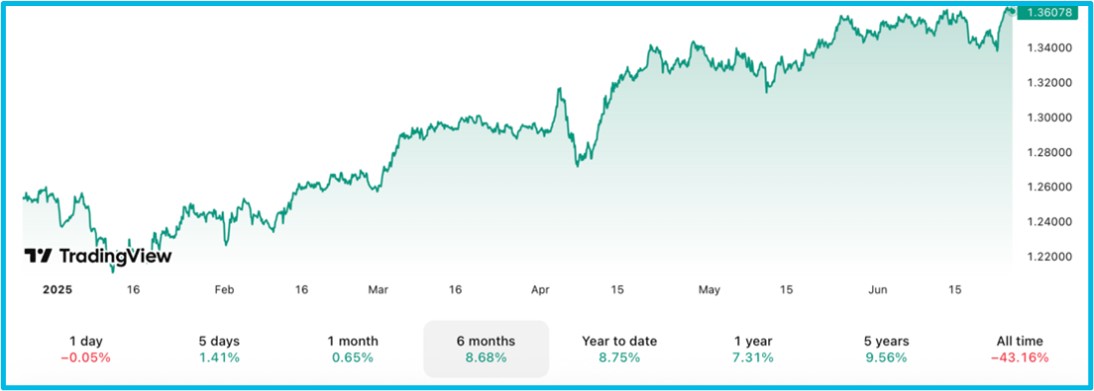Investment Market Update
It was a pleasant surprise to read in a recent article on Bloomberg that “the risks facing the stock market are swiftly diminishing as economic growth remains solid despite the turmoil from tariffs and geopolitics. Equities have been remarkably resilient over the past two months as the S&P 500 bounced sharply from April lows, putting it less than 1% away from its record high”.
UK investors were hindered as the dollar weakened against sterling. As can be seen in the chart from TradingView, the dollar has weakened by over 8% this year.

Much of the damage was done following the bond market’s reaction to the scale and impact of the tariffs and concern over Trump’s ‘Big, Beautiful Bill’ that will further substantially increase the USA’s debt.
Hopefully, as the 90-day tariff negotiating period comes to an end in early July and if the ceasefire in the Middle East can be maintained, there will be no further turmoil and extreme volatility. That is very optimistic.
The article also noted that a strategist from Barclays plc commented that “it is dangerous for investors to overreact on such events which typically turn out to be entry points than lasting selloffs”. A view we would wholeheartedly concur with.
As the FE Fundinfo chart shows, the recovery from the tariff turmoil has been swift. It is also interesting to see that the unloved UK equity market is leading the pack. The recovery in the US market has started to cause some commentators concern believing it is screening expensive across many metrics.

The latest to comment is the Bank of America. Following the ceasefire in the Middle East, the Nasdaq 100 hit a record high, so no doubt the noise over valuations will grow.
We have met many fund managers over the last two months, and it is pleasing that all appear positive. Fixed income managers see many opportunities to deliver attractive returns following a decade of low and even negative interest rates. We share the longer-term optimism but expect that further unpredictable surprises will come from the White House. There is still much boiling away that could cause disruption and cause uncertainty. Perhaps, closest to home is the uncertainty on the relationship between the USA and the EU. The tariffs are not agreed and the European Union plan to impose retaliatory tariffs on US imports if President Trump puts a baseline levy on the bloc’s goods as many expect he will. So, we are far from reaching calmer waters.
Individual Investor Sentiment in 2025
Investors have been on an emotional roller coaster over the first 25 years of the 21st century. On the downside, they held on for dear life as the dot-com bubble, Global Financial Crisis, European debt crisis, Covid, and a historic bout of inflation played out in headlines and portfolios. But along with the losses, investors found compelling gains. A decade of record-low interest rates buoyed stocks, and the tech sector boomed. It was a thrill ride that produced impressive returns for those with the nerve to hold on for the long run. How do individual investors view the future? Are you alone in your thinking?
Natixis Investment Managers carried out a global survey of Individual Investors (conducted by CoreData Research in February and March 2025) and we thought that some of the outputs might be of interest in this challenging world. The survey included 7,050 individual investors in 21 countries. Historical returns were so strong and so consistent that nearly half (48%) of 7,050 investors included in the 2025 survey say it made investing look easy. Hindsight is a wonderful thing! However, a deeper look at sentiment among these investors in 21 countries suggests something has changed, and few think it will be easy going forward.
Of those polled between February and March, before the “Liberation Day” tariff tantrum:
- 35% of those surveyed believed the market run would continue.
- 53% said they were comfortable taking risks to get ahead.
- 23% have ‘given up’, saying they don’t know what to do,
- 21% said they were getting out while they still could.
The reality is that investors believe their backs are against the wall in 2025, and it’s changing how they feel about investing, the markets, and their future. Investment strategy is evolving rapidly, and some are having trouble keeping up.
It adds up to an environment in which long-term return “expectations” have dropped from the 12.8% above inflation recorded in 2023 to 10.7% above inflation. This is challenging, particularly for the majority (47%) who say they have a moderate tolerance for risk. Time will tell if two years of double-digit market gains have created an over-optimistic view and it should be noted that the survey took place before the Trump tariff turmoil in early April.
Beyond moderating return expectations, investors are concerned about how much they’ll actually keep. Taxes rank high as both an investment concern (28%) and a financial fear (34%). Diminished market expectations may also signal a shift in how they view active management. Two-thirds say they do not want to be dependent on market returns however no alternative solutions are given to improve performance.
Inflation remains stubbornly elevated, and less than half of those surveyed think high costs are in the rearview mirror. Uncertainty prevails, and seven in ten say instability has them worried about their finances. Tax policies are in flux in many developed countries and less than half think the new policies will benefit them.
High interest rates seem likely to be cut at some point, however just 3% of investors know what that actually means for bonds. Many think private assets can help but are confused about which are right for them.
At a time like this, investors value professional advice. Those surveyed are more likely to trust their advisor (91%) than themselves (88%) when making financial decisions.
But they are not merely looking for buy and sell recommendations. One of the facets they most value in their relationship with an advisor is having someone who takes the time to understand them and their unique situation.
Among those who work with an advisor 32% say they are working in partnership, while 31% say they make decisions based on their advisor’s recommendations.
Overall, investors value a relationship that extends beyond the portfolio such as retirement income planning (46%) and financial planning services (46%) to go along with their portfolio strategy.
Douglas Kearney C.A. Investment Director
The above article is intended to be a topical commentary and should not be construed as financial advice. Past performance is not an indicator of future returns. Any news and/or views expressed within this document are intended as general information only and should not be viewed as a form of personal recommendation.
